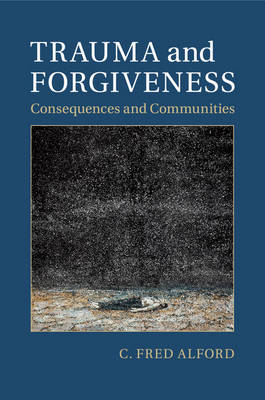
Trauma and Forgiveness
Consequences and Communities
Seiten
2015
Cambridge University Press (Verlag)
978-1-107-62660-7 (ISBN)
Cambridge University Press (Verlag)
978-1-107-62660-7 (ISBN)
C. Fred Alford argues that the traumatized are generally capable of representing their experience. Using evidence from the testimonies of Holocaust survivors, as well as the victims of 'ordinary' trauma, he shows that forgiveness is generally a way of avoiding the hurt and pain of coming to terms with trauma.
Contrary to the view of trauma popularized by literary theorists, Trauma and Forgiveness argues that the traumatized are capable of representing their experience and that we should therefore listen more and theorize less. Using stories and case studies, including testimonies from Holocaust survivors, as well as the victims of 'ordinary' trauma, C. Fred Alford shows that, while the traumatized are generally capable of representing their experience, this does little to heal them. He draws on the British Object Relations tradition in psychoanalysis to argue that forgiveness, which might be expected to help heal the traumatized, is generally an attempt to avoid the hard work of mourning losses that can never be made whole. Forgiveness is better seen as a virtue in the classical sense, a recognition of human vulnerability. The book concludes with an extended case study of the essayist Jean Améry and his refusal to forgive.
Contrary to the view of trauma popularized by literary theorists, Trauma and Forgiveness argues that the traumatized are capable of representing their experience and that we should therefore listen more and theorize less. Using stories and case studies, including testimonies from Holocaust survivors, as well as the victims of 'ordinary' trauma, C. Fred Alford shows that, while the traumatized are generally capable of representing their experience, this does little to heal them. He draws on the British Object Relations tradition in psychoanalysis to argue that forgiveness, which might be expected to help heal the traumatized, is generally an attempt to avoid the hard work of mourning losses that can never be made whole. Forgiveness is better seen as a virtue in the classical sense, a recognition of human vulnerability. The book concludes with an extended case study of the essayist Jean Améry and his refusal to forgive.
C. Fred Alford is Professor of Government and Politics and Distinguished Scholar-Teacher at the University of Maryland, College Park. He is author of over fifteen books on moral psychology, including After the Holocaust (2009) and Psychology and the Natural Law of Reparation (2006).
1. Introduction: trauma and forgiveness; 2. Is the Holocaust traumatic?; 3. Winnicott and trauma; 4. Melanie Klein and forgiveness: theory; 5. Melanie Klein and forgiveness: practice; 6. Winnicott: forgiveness and transitional experience; 7. Jean Améry: resentment, loneliness, and aging; 8. Conclusion: trauma as knowledge.
| Verlagsort | Cambridge |
|---|---|
| Sprache | englisch |
| Maße | 150 x 230 mm |
| Gewicht | 350 g |
| Themenwelt | Geisteswissenschaften ► Psychologie ► Klinische Psychologie |
| Geisteswissenschaften ► Psychologie ► Persönlichkeitsstörungen | |
| Geisteswissenschaften ► Psychologie ► Sozialpsychologie | |
| Geisteswissenschaften ► Psychologie ► Traumatherapie | |
| Sozialwissenschaften ► Soziologie | |
| ISBN-10 | 1-107-62660-9 / 1107626609 |
| ISBN-13 | 978-1-107-62660-7 / 9781107626607 |
| Zustand | Neuware |
| Haben Sie eine Frage zum Produkt? |
Mehr entdecken
aus dem Bereich
aus dem Bereich
Information • Energie • Materie
Buch | Softcover (2015)
Lehmanns Media (Verlag)
CHF 41,90
Buch | Hardcover (2024)
Kohlhammer (Verlag)
CHF 219,95
Manual zur Dokumentation des psychischen Befundes in Psychiatrie, …
Buch | Softcover (2023)
Hogrefe Verlag
CHF 39,95


